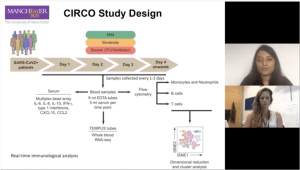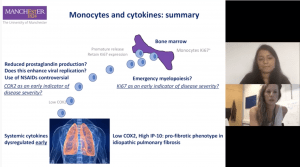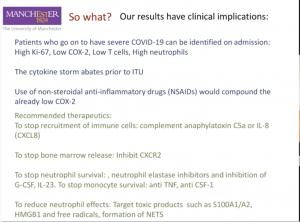Elizabeth Mann and Madhvi Menon discuss findings from their recent longitudinal immune profiling study with admitted COVID-19 patients across four hospitals in Manchester at the height of the pandemic in the UK.
Madvi Menon began the webinar describing the Coronavirus Immune Response and Clinical Outcomes (CIRCO) Study, which collected samples longitudinally from individuals (n=49) with SARS-CoV-2 with varying severity. Blood samples were then used to profile serum cytokine levels, transcriptomic analysis (RNA-Seq) and cellular composition (flow cytometry) (Image below). Using this cohort and experimental design the aimed to determine (1) immune kinetics associated with disease severity, (2) identify potential biomarkers that could predict disease severity and (3) immunological features that track patient recovery.
As described by others, severity of disease was associated with a decrease in CD3+ T cell and increase in CD16+ neutrophils. Madvi also showed that recovery was associated with restoration of T cell and neutrophil levels to normal levels. Overall, plasmablasts and CD27-IgD- B cells were expanded in all COVID-19 patients, regardless of diseases severity. Madhvi completed her talk by suggesting that Neutrophil: T cell ratio could potentially predict disease severity.
Elizabeth Mann began her talk describing the important roles monocytes play in respiratory infection. She highlighted that though monocytes release important effector functions which aim at controlling viral levels, these molecules can contribute to inflammation and tissue damage if left unchecked. Elizabeth showed that COVID-19 was associated with increased Ki-67+ expressing monocytes which correlated with C-reactive protein (clinical marker of inflammation). She then suggested that detection of this monocyte subset, is could be associated with emergency myelopoiesis (enhanced release of monocytes that express Ki-67). Interestingly, Ki-67 levels decreased with time of infection, suggesting that Ki-67+ monocytes could be an early marker of disease severity. They also showed that COVID-19 was associated with decreased expression of cycol-oxygenase 2 (COX2), and levels of this molecules quickly restore to normal in mild patients. Other highlights of the talk are summarised in the figure below.
Based on their results, they suggest that therapeutics that could be used to different aspects of COVID-19 pathology (summarised below).
Summary by Cheleka Mpande













